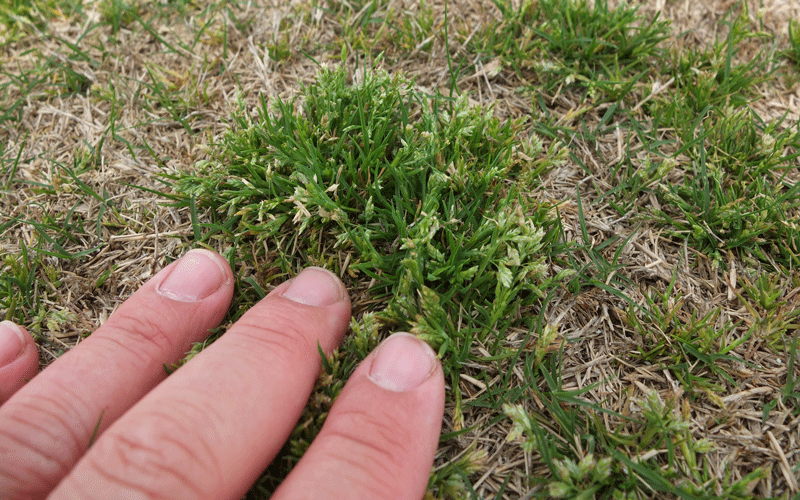Planning for Fall Poa annua Control in Warm-season Lawns
Recent research and practical experience are clearly showing that applications in mid-to-late fall are now more effective than traditional late summer applications for controlling Poa annua in warm-season turf. Not only can highly effective control be expected, herbicide mixes used at this time will go a long way to minimize the chances of resistance. Here’s advice on applications made at the traditional timing as well as later in the fall.
-
Traditional PRE option (Good): Specticle® FLO applied in early fall has been exceptionally effective for many years
- Poa annua starts germinating when 4” soil temperatures reach 72oF, and germination flushes are always accompanied by rainfall so germination will not occur in late summer/early fall droughts
- Application of Specticle should be made prior to this soil temperature and should be watered in with 0.25” irrigation
- Split applications in the fall always improve control given tropical storms and inconsistent winter weather
- Recent research at the University of Tennessee indicates that some Poa annua plants may survive in low stress areas like shade, but are usually small and not visible in the bermudagrass canopy. Therefore, consider including a POST herbicide like Tribute® Total to help control early escapes
-
Better Fall option – Envu’s Dual Defense is a tank-mix of two herbicides (Specticle FLO + Celsius WDG)
- Designed to deliver consistent annual bluegrass control and minimize risk for developing resistance
-
Dual Defense applications can be applied at the traditional PRE timing or early POST timing to young (1-4 leaf) Poa annua
- Single or split applications can be made starting in September or early October in most regions based on your location, weather, and amount of annual bluegrass germination
- Rates, timings, and application intervals can also be based on weather and previous experience. Typical rates are Specticle FLO (6-9 fl oz/A) + Celsius WDG (3 oz/A)
- Dual Defense also controls winter annual broadleaves
-
The Best Fall option – Envu’s PRE3 is a tank-mix of three herbicides (Specticle FLO + Tribute Total + simazine)
- Designed to deliver the most effective and most consistent annual bluegrass control and reduce the likelihood of developing resistance
- Similar to Dual Defense, PRE3 applications should be applied as single or split applications in late-October or November and rates, timings, and intervals can be modified to meet local conditions
- Unlike Dual Defense, PRE3 is effective on fairly large Poa annua so can be applied later in the fall
- PRE3 also is highly effective with problematic winter annual broadleaves and annual sedges
- Typical rates are Specticle FLO (6 fl oz/A) + Tribute Total (1 oz/A) + simazine (32 fl oz/A)
-
Why wait? Waiting later and applying a PRE/POST tank-mix after significant Poa annua germination provides greater benefits including:
- Wider window of effective application timings since annual bluegrass germination can vary from year to year
-
A wider application window also means more flexibility and convenience for turf managers, especially when facing variable fall and winter weather including:
- Heavy rainfalls from tropical storms that could leach and degrade herbicides
- Warm temperatures that could encourage annual bluegrass germination throughout the winter
- Severe cold that could exaggerate winterkill
- Improved control of other winter annuals like henbit and chickweed that are later-germinating
- University research has shown that tank-mixing herbicides with different sites of action is more effective than rotating herbicides with different sites of action when weed resistance management is being considered
- More information – always refer to the label for specific recommendations and contact your Envu area sales manager if you need assistance
| Solution sheet - Cool - Poa Annua | |
| Solution sheet - Warm - Poa Annua | |
| Solution sheet - Annual Bluegrass Seedhead |

Envu’s Dual Defense and PRE3 tank-mixes will control emerged Poa annua and other weeds and provide long-term residual control (Envu)


